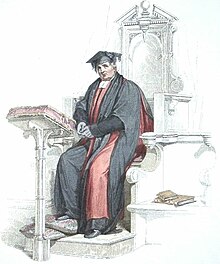Doctor theologiae

Doctor theologiae , abbreviated Dr. theol. , is the Latin name for a doctor (academic teacher) in theology and the doctoral degree in Christian theology . For the theological honorary doctor , instead of the abbreviation Dr. theol. hc also the short form D. usual.
This title was the highest academic degree up to the early modern period and was therefore on a par with today's university professor . So was z. B. Martin Luther , even after his reputation as a theologian had long since penetrated Wittenberg , continued to speak of "the Doctor Luther".
Study regulations
Today's study regulations in theology prescribe a dissertation and a two-year “doctoral program” in addition to the completion of a relevant course (which usually end with a licentiate or a master’s degree) .
The dissertation (also called “doctoral thesis”) must demonstrate the ability to do scientific work and contain new knowledge. The process usually ends with the defensio (defense of the dissertation) and the rigorosum ("strict examination") with detailed regulations as they correspond to the respective university doctoral regulations.
However, the majority of Catholic priests and Protestant pastors have completed their theology studies with a diploma or a church examination (or state examination ). Those theologians who are interested in special research or a university career aim for a doctorate .
Technical assignment
For Catholic or Protestant theology, the dissertation is usually assigned to one of the following subject areas:
Systematic theology
- Fundamental theology , philosophy of religion and science of religion
- Ethics or moral theology
- Dogmatics (including Christology , Trinitarian doctrine of God , ecclesiology , eschatology , theological anthropology )
Practical theology
( Pastoral care and its fundamental subjects)
- Pastoral theology and diaconalism
- Religious Education and Catechetics
- Liturgy and Homiletics
- Missiology
- Church music
- Canon Law
Biblical theology
- Hermeneutics
- Exegesis of the Old Testament (history, theology, ethics)
- Exegesis of the New Testament (history, theology, ethics)
Church history
- Older Church History, Christian Archeology and Patrology : Early Christianity and Church Fathers
- Middle and modern church history: Middle Ages , Reformation times , modern times and ecumenism
- History of dogma or theology